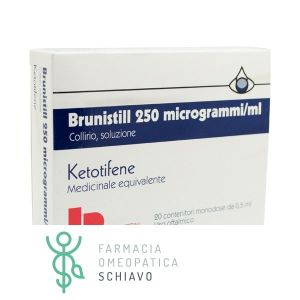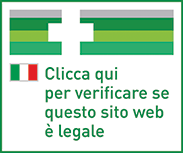Ship in Europe, Find out rates!
Brunistill Eye drops 0.025 mg Ketotifen Conjunctivitis 20 vials 0.5 ml

- box Delivery in Italy in 24/48 and free returns
- star3.000+ positive reviews
- dropboxOver 60,000 products in the catalog
Ketotifen-based eye drops.
Therapeutic indications
Brunistill is used in the symptomatic treatment of seasonal allergic conjunctivitis.
Dosage and Posology
The drug should be taken according to the following doses and methods in adults, the elderly and children (over 3 years): one drop of eye drops in the conjunctival sac twice a day. The content of a single-dose container is sufficient for one administration in both eyes.
Contents and container remain sterile until the original closure is opened. To avoid the risk of contamination, do not touch any surface with the tip of the container.
Overdose
No cases of overdose have been reported. Oral intake of the contents of a single-dose container would be equivalent to 0.1 mg of ketotifen, which is 5% of a recommended daily oral dose for a 3-year-old child. Clinical results indicated no serious signs or symptoms after ingestion of a dose of up to 20 mg of ketotifen.
Contraindications
Hypersensitivity to the active substance or to any of the excipients.
Side effects
Adverse drug reactions from clinical trials (Table 1) are listed according to the MedDRA classification. Within each system organ class, adverse drug reactions are ranked by frequency with the most frequent first. Within each frequency group, reactions are presented in order of decreasing severity. The following undesirable effects have been reported at the recommended dose: The frequency listed below is defined using the following convention: very common (≥ 1/10), common (≥ 1/100 to <1/10); uncommon (≥ 1/1000 <1/100); rare (≥ 1 / 10,000 to <1 / 1,000); very rare (<1 / 10,000), not known (cannot be estimated from the available data).
- Eye disorders:
- Common: eye irritation, eye pain, punctate keratitis, punctate epithelial erosion
- Uncommon: blurred vision (during instillation), dry eye, eyelid disorders, conjunctivitis, photophobia, conjunctival haemorrhages
- Nervous system disorders:
- Uncommon: Headache
General disorders and administration site conditions
- Uncommon: somnolence
- Skin and subcutaneous tissue disorders:
- Uncommon: rash, eczema, urticaria
- Gastrointestinal disorders:
- Uncommon: dry mouth
- Immune system disorders:
- Uncommon: hypersensitivity
The following post-marketing events have also been observed: hypersensitivity reactions including local allergic reactions (mostly contact dermatitis, eye swelling, eyelid itching and edema), systemic allergic reactions including facial swelling / edema (in some cases associated contact dermatitis) and exacerbation of pre-existing allergic conditions such as asthma and eczema.
Pregnancy and breastfeeding
No clinical data are available on the use of Brunistillin during pregnancy. Animal studies with toxic oral doses have shown an increase in pre- and postnatal mortality, but have not shown teratogenic effects. Systemic levels of ketotifen after ophthalmic application are much lower than those achieved after oral administration. However, caution should be exercised when prescribing the medicine to pregnant women.
Although data from consecutive animal studies with oral administration demonstrate excretion of the active substance in breast milk, it is unlikely that topical administration in women will produce detectable quantities of the active substance in breast milk. Mothers who use Brunistillcollirio can therefore breastfeed.
There are no data on the effect of ketotifen hydrogen fumarate on fertility in humans.
Special warnings
No special precautions.
Expiry and retention
Check the expiration date indicated on the package. The expiry date indicated on the package refers to the product in intact packaging, correctly stored. Store at a temperature not exceeding 25 ° C.
Warning : do not use the medicine after the expiry date indicated on the package.
Composition
A single-dose container of Brunistill contains:
Active principle
Ketotifen 125 micrograms (as hydrogen fumarate), equivalent to 250 micrograms / ml
Excipients
Glycerol (E422), Sodium Hydroxide, Purified water


